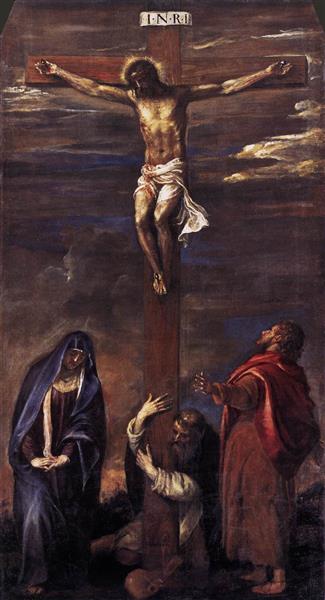Opis
Titian's painting "The Crucifixion" (1558) is a work that encapsulates the dramatic climax of the Christian narrative in a visual format that captures the viewer's attention and imagination. One of the Venetian master's last creations, this painting reflects both his technical mastery and his ability to evoke deep emotions through composition and color. Titian, in his long career, experimented with a diversity of subjects and styles, but in this work, his focus on Christ's sacrifice is presented with a stunning emotionality that resonates with the viewer.
The Crucifixion is placed at the centre of the composition, showing Christ on the cross, surrounded by a collage of figures representing both sorrow and condemnation. The arrangement of the characters is crucial; the pain of Mother Mary is palpable, her figure at the foot of the cross, her expression of despair and suffering contrasting with the intense light that focuses on the figure of Christ. The use of colour in this work is especially noticeable; Titian’s vibrant palette combines warm and cool tones that offer a profound sense of space and light. The applications of pigments are bold and energetic, a testament to the painter’s technique, who was not afraid to explore colour saturation to intensify the visual and emotional experience.
One of the most striking features of this painting is the treatment of light and shadow. The luminosity surrounding Christ contrasts with the denser shadows surrounding the other figures, creating a visual focus that directs attention to the central drama of the crucifixion. This use of chiaroscuro not only creates depth, but also symbolizes the duality of sacrifice: the light of redemption versus the darkness of death and suffering.
Throughout his career, Titian incorporated elements from his Venetian surroundings, giving this work a sense of the local and the universal. The influence of the Italian Renaissance is evident in the anatomy of the figures, which are often rendered with an almost sculptural realism. The Crucifixion of 1558 is not the only work of art to address this same subject matter; earlier and contemporary works have explored the same event, although Titian is distinguished by his passionate display of emotion and his ability to combine drama with beauty.
This painting is also subject to analysis for its historical context. Painted at a time when the Counter-Reformation was in full swing, the work served as a powerful visual reminder of the Christian faith and its relevance to the daily and spiritual life of the time. Through his deeply human depiction of the crucifixion, Titian invites not only contemplation of the sacred scene, but also a reflection on suffering and redemption.
Representing the culmination of Titian’s artistic evolution, the work is not only a testament to his technical prowess, but is also a link that connects viewers of the past with those of the present. “The Crucifixion” not only captures the pain inherent in the crucifixion, but also invites the viewer to participate in the emotional experience that the scene evokes, a sense of sacrifice that transcends time and space. Titian’s mastery of this iconic moment in Christian history remains a beacon of his legacy and impact on the art world.
KUADROS ©, a famous painting on your wall.
Hand-made oil painting reproductions, with the quality of professional artists and the distinctive seal of KUADROS ©.
Painting reproduction service with satisfaction guarantee. If you are not completely satisfied with the replica of your painting, we will refund 100% of your money.

